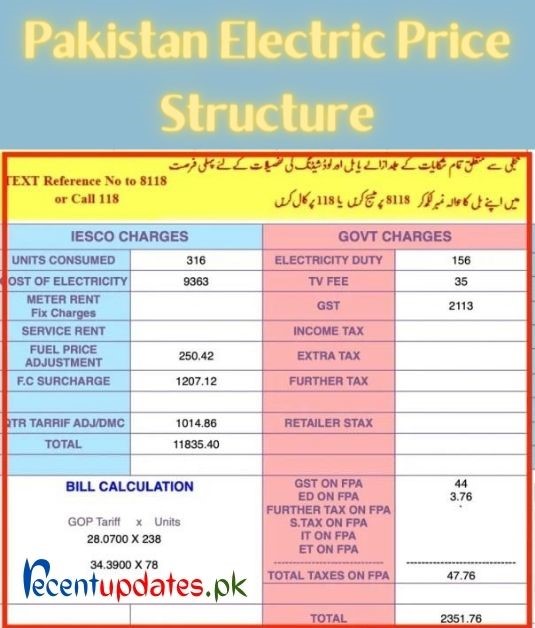Electricity Prices Go Up in Pakistan in 2024: Get Ready for a Shock! Prepare for the latest news about the higher electricity rates. Learn some tips to handle your budget during this surprising increase. Get set to deal with the rising cost of energy!
In the face of these rising electricity prices, it’s essential to explore ways to conserve energy and minimize expenses. Consider simple changes like turning off lights when not in use or unplugging electronics when they’re fully charged. Additionally, investing in energy-efficient appliances can lead to long-term savings on your electricity bills. Remember, every small step counts towards a more sustainable and cost-effective future. Let’s work together to power through these challenges and build a brighter tomorrow for Pakistan.
Key Points
Electricity Per Unit Price in Pakistan
In 2024, the electric unit price in Pakistan experienced notable fluctuations, impacting both households and businesses alike. It’s essential to grasp these changes to effectively manage expenses, whether at home or in business operations.
Domestic Rate of Electric Per Unit
For households, the per-unit price of electricity varies depending on the amount consumed. As consumption increases, so do the rates, presenting budgetary challenges for families.
| Bijli Units | Price per 1 Unit (kWh) |
|---|---|
| Below 50 | Rs. 5.95/- |
| 1 – 100 | Rs. 7.67/- |
| 100 – 200 | Rs. 18.55/- |
| 201 – 300 | Rs. 24.86/- |
| 301 – 700 | Rs. 27.56/- |
| Above 700 | Rs. 35.54/- |
Commercial Rate of Electricity Per Unit
Commercial consumers face different rates. Businesses with heavier electricity usage face increased charges, impacting their operational expenses.
| Load | Rate per Unit (kWh) |
|---|---|
| Less than 5kW load | Rs. 38.80/- |
| More than 5kW load | Rs. 40.26/- |
Pakistan Electric Price Structure
It’s crucial for consumers in Pakistan to understand the components that make up the electric price structure. This understanding enables them to accurately interpret their bills.

Electricity Suppliers Charges
- Meter Rent (if applicable)
- Service Rent (if applicable)
- Fuel Price Adjustment in the price of fuel
- F.C Surcharge
- T.R Surcharge
Government Charges
- Electricity Duty
- TV Fee
- General Sales Tax (GST)
- GST On Fuel Price Adjustment
- ED On Fuel Price Adjustment
How to Calculate Your Electricity Bill?
To calculate your electricity bill in Pakistan, you need to multiply the units consumed by the base tariff, and then add applicable charges, taxes, and peak hour charges if applicable.
Here’s a simplified example of calculating an electricity bill:
Let’s say the base tariff is Rs. 10 per unit.
You consumed 100 units of electricity during the billing cycle.
Calculation:
Base Tariff: Rs. 10 x 100 units = Rs. 1,000
Fuel Adjustment Charges: Rs. 0
Tax & Surcharges: Assuming 15% of the base tariff, Tax & Surcharges = Rs. 1,000 x 0.15 = Rs. 150
Total Bill: Rs. 1,000 (Base Tariff) + Rs. 0 (Fuel Adjustment Charges) + Rs. 150 (Tax & Surcharges) = Rs. 1,150
In this example, the total bill would be Rs. 1,150 for the consumption of 100 units of electricity, excluding any peak hour charges or additional fees.
Note: It’s worth noting that peak hour consumption can significantly impact the total bill amount.
Pakistan Electric Companies
Several electric distribution companies operate in Pakistan, serving different regions:
- Karachi Electric Supply Company (KESCO)
- Islamabad Electric Supply Company (IESCO)
- Lahore Electric Supply Company (LESCO)
- Multan Electric Power Company (MEPCO)
- Faisalabad Electric Supply Company (FESCO)
- Gujranwala Electric Power Company (GEPCO)
- Hyderabad Electric Supply Company (HESCO)
- Peshawar Electric Power Company (PESCO)
- Quetta Electric Supply Company (QESCO)
- Sukkur Electric Power Company (SEPCO)
- Tribal Electric Supply Company (TESCO)
Understanding the distribution companies is crucial for consumers to identify their service provider and access relevant information.
Summary
In summary, with the rise in electric unit prices in Pakistan, it’s important for everyone to stay informed and take action. By knowing how rates are set, calculating bills accurately, and staying in touch with your electric company, you can manage your expenses better. Also, consider saving energy to ease the burden on your budget and help create a more sustainable future for Pakistan.
